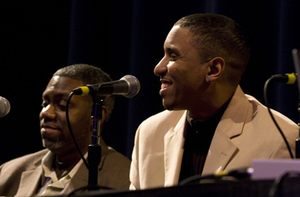An Eye on the Hip-Hop Industry

Andrew Dawson and James "Big Hawk" Hawkins
Photo by Brit Woollard

Mike Warner and JoJo Brim, panelists at Berklee's second annual Business of Hip-Hop Symposium.
Photo by Brit Woollard

Morace Landy, Andreas Hale, Mike Warner, JoJo Brim, Andrew Dawson, Big Hawk, and Prince Charles Alexander participate in a panel discusson at the symposium.
Photo by Brit Woollard
Berklee's recent forays into hip-hop—from classes in turntable technique to clinics by luminaries like Chuck D or Grandmaster Flash—have helped integrate the genre into the college in a meaningful way.
The second annual Business of Hip-Hop Symposium built on that momentum with an expanded format, which was a testament to last year's success as well as to the genre's importance to the music industry.
Planners reprised a panel discussion featuring esteemed hip-hop professionals at the David Friend Recital Hall, and added a higher-profile evening event at the Berklee Performance Center: an all-star line-up of music industry veterans waxing on hip-hop's present and future.
The audience for this year's event—presented by the Music Business/Management Department and cosponsored by the Professional Education Division, the Office of Academic Affairs, and the Office of Cultural Diversity—hailed from as far as New York and Ohio, as well as from area colleges and universities, and included prominent members of Boston's hip-hop scene.
The evening panel, moderated by Berklee's multi-Grammy-winning faculty member Prince Charles Alexander, delved into the intellectualizing and commercializing of hip-hop, and the ever-changing role of the internet.
Viewing the genre as more than just music—but as a voice, a mindset, and a culture—the panelists agreed that hip-hop offerings in academia are positive and educational, and help to advance the genre. Indeed, because so many young people are ignorant of the history of hip-hop, the music—or the music that it draws from—should be taught formally, noted panelist Andreas Hale, editor-in-chief of HipHopDX.com.
Engineer and alumnus Andrew Dawson '01—winner of a Grammy Award for his work with Kanye West—talked about how his musical training at Berklee has aided him in his extensive hip-hop studio work (writing an occasional horn chart, for example). To him, hip-hop is "a feeling" akin to viewing a painting by Jackson Pollock or Andy Warhol: "You know it works, but you don't necessarily know why." Alexander agreed, noting that he compares hip-hop to Picasso's rule-breaking approach to art.
The panelists also discussed hip-hop's perceived moral and creative woes. Lupe Fiasco (whom panelist Morace Landy, executive vice president of urban promotions for Atlantic Records, represents) was held up by several panel members as a shining example of a mainstream hip-hop artist who not only offers more substantive music, but is successful with it as well.
There's a time and place for all subgenres of hip-hop, said JoJo Brim, a Grammy-nominated producer and partner in Fly By Music, noting that commercial hits sound great in the club, but "Lupe gets to ride in the car, with me and my deepest emotions. Souljah Boy's not comin'."
Surprise guest James "Big Hawk" Hawkins, president of Source Entertainment and Down magazine vice president, had this to say about one hip-hop stereotype: "Gettin' shot has nothing to do with hip-hop. That's crime!"
When it comes to the internet, an artist needs to strategically and wisely choose a marketing strategy. "It's not about being everywhere—it's about being in the right 'where.' Too much circulation cheapens the [product]," Brim said, explaining that he gets too many mp3s from wannabe "promotions companies" with very little going for them but large email lists.
There was a formidable amount of wisdom on stage that night, and many in the crowd were hungry to share in it. Panel member Michael Warner (CEO, M. Warner Enterprises) offered a recipe for a successful musical journey: "One, you gotta do it for the love. You do it for any other reason, you're gonna fail miserably. The second thing is, you don't quit. The day you quit, the next day is the day you could've made it, so don't watch a clock while you do it. And the third thing is, stop looking for it to give you something and give something to it."
"So many people are rapping for all the wrong reasons," said Hale. "If you want money, go get a job. If you wanna rap, if it's what you wanna do, then do it, but for those that are in it for the money, get out of the way and let the real people do it."
The afternoon panel featured Brim and Hale, along with Voice Department faculty member Armsted Christian, a Grammy nominee and SESAC Award winner; Charles-Chase Davis, principal and CCO, Crescendo Worldwide; Renee Ochoa, founder/CEO, I've Got Entertainment; and Emmett G. Price author/professor, music/African-American history, Northeastern University. Kevin Johnson, a multicultural educator and program manager for Berklee's Office of Cultural Diversity, moderated with Christian.
The hour-long conversation was set in motion with the question of whether artists and industry professionals have a responsibility to address or curtail some of the misogyny and homophobia prevalent in some corners of the rap world. Brim somewhat decried the idea, advancing the "change-people's-hearts-first" argument: "Nothing serves you greater than your own truth-[nothing can change] unless we start getting down to what's going on inside of people first." Price agreed, describing the sometime-conflict "between culture and capitalism" that contributes to the problem, and reminding the crowd that everything has an audience: what doesn't speak to one listener speaks to another, and "may even keep that cat from committing suicide—you don't know!"
Price emphasized the importance of knowing the historical perspective and chronology of hip-hop to truly understand it and keep from misrepresenting it.
The success of the symposium—and the expressed desire of several panelists to work more closely with the college—boded very well not only for the future of hip-hop at Berklee and for next year's symposium, but the school's increased connections in the industry. Any artist—aspiring or veteran, hip-hop or otherwise—would be wise to attend next year's event.
